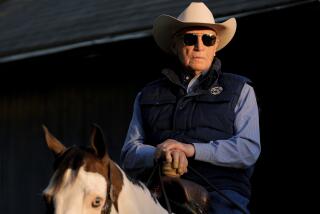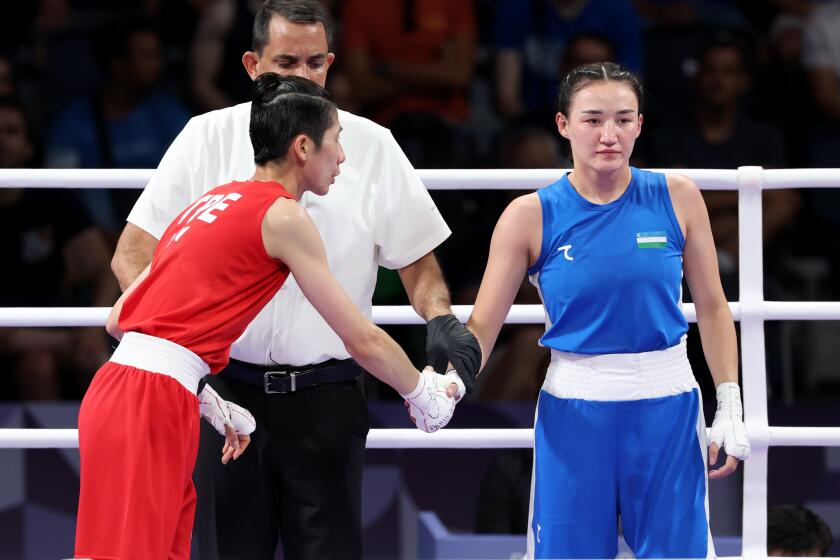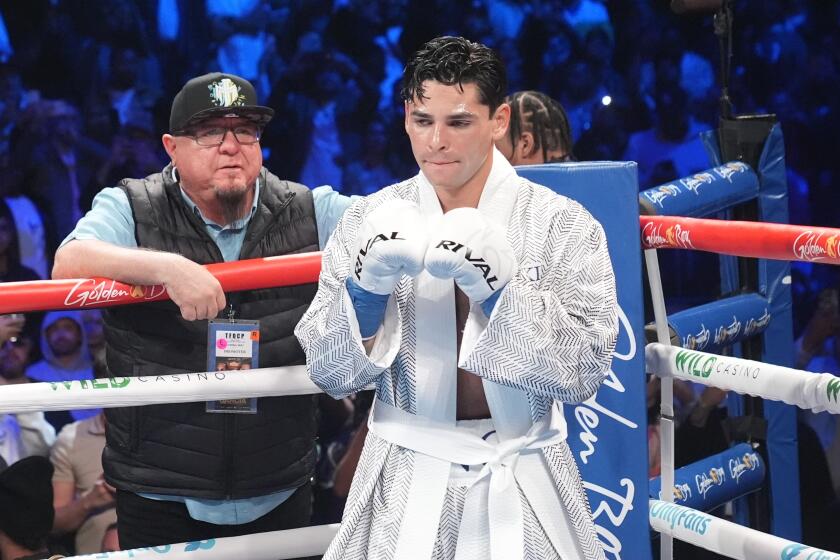A Setback for Barbaro
He has never spoken to us. He has never gestured to us.
He has never signed an autograph or shaken a hand, or sat for an interview, or smiled for the camera.
Most of us have seen him compete for a total of two minutes.
None of us would recognize him without pink silk around his waist and a little man on his back.
So, then, why?
Why so much love for Barbaro?
Why so much love for a, um, horse?
As the Kentucky Derby champion teetered on the brink of death Thursday because of complications arising from his right ankle fracture, a nation mourned even as it wondered.
Why so much love for a, ahem, horse?
Tearful fans crowded the Pennsylvania equine hospital, bringing flowers Barbaro cannot hold and cards he cannot read.
Carrots and apples filled envelopes he cannot open. A fence contained inspirational banners he cannot see.
For the near-eight weeks since his injury at the Preakness, Barbaro has been the beneficiary of the sort of national sentiment not felt in the sports community since the 2001 death of Dale Earnhardt.
But the crusty, common-man Earnhardt was that rare champion who was considered no different than his loyal fans.
Barbaro isn’t even the same species.
“People love their race horses, there’s a special bond between them,” said Dr. Ted Simpson, a longtime local equine veterinarian.
But why?
Looking at the date of Barbaro’s greatest triumph, one could find five good reasons.
It was May 6. Barbaro won the Kentucky Derby by 6 1/2 lengths, the biggest margin of victory in 60 years, and seemed poised to become the first Triple Crown winner in 28 years.
The five reasons for his popularity can be found not in those statistics, perhaps, but in the hard realities of what else happened that day.
1) The Lakers’ Kobe Bryant was called a quitter after taking three shots in the second half of Game 7 against the Phoenix Suns.
2) George Mitchell, baseball’s steroid investigator, was called a snoop after requesting major leaguers’ medical records.
3) Don King, boxing’s convicted felon promoter, lost a fight.
4) The Dodgers’ Brad Penny, three weeks before throwing a tantrum on the mound, started a game.
5) The San Francisco Giants put Moises Alou, an outfielder who says he toughens his hands by urinating on them, on the disabled list.
Why so much love for a horse?
Maybe because Barbaro has never done any of those things?
“That’s exactly why we love him,” said Dr. Marc Shatz, a Beverly Hills psychologist. “He has become idealized because he cannot do the things that human beings do that we don’t like.”
Imagine that.
A sprint champion who is not on steroids. A kid prodigy who has not committed an NCAA rules violation.
A stud who is not involved in a sex scandal. A silk-wearing winner who eats grass instead of smoking it.
That is Barbaro, and more.
An athlete who wins the biggest race of the year and does not brag about it. An athlete who wins by a huge margin yet doesn’t dance or point or even look behind him at the losers.
An athlete who is given a champions’ bed of roses, yet does not spike them, or twirl them, or strut across the track with them.
Instead of ignoring Barbaro because he can’t talk to us, we love him because he cannot talk to us.
Instead of dismissing Barbaro because he competes without responding to anything but his heart, well, isn’t that the way it should be?
The love for Barbaro, perhaps, isn’t one born of delight as much as desperation.
We are so sick of contemporary sports heroes, we’ll embrace those who cannot offend and will never insult.
Which pretty much leaves us with, er, horses.
Oh, and yes, it helps that Barbaro would have made plenty of money that he can never spend, and would have plenty of carnal company yet would never boast.
“Race horses go out, lay their bodies down, and never complain,” Simpson said. “We love our stoic heroes. That’s a race horse.”
Some might say that the owners loved Barbaro too much, keeping him alive longer than is humanely fair because of the benefits of publicity and potential stud fees.
Simpson, who has performed two operations similar to the one undergone by Barbaro, disagreed.
One of those surgeries was on a slow horse with virtually no value except in the $100,000 life insurance policy it would have reaped its owners upon its death.
One of those owners paid the claim amount to the other owners and ordered the surgery anyway.
“Today, that horse is standing on a farm in Ontario, eating oats and playing around and having a great time,” Simpson said. “The owner loved that horse, and didn’t want it to die no matter what. That’s how people are about their horses.”
That’s how a nation is today, holding its breath for a champion who will have no last words, dreading the loss of an ideal that has spoken loudly.
*
Bill Plaschke can be reached at [email protected]. To read previous columns by Plaschke, go to latimes.com/plaschke.
More to Read
Go beyond the scoreboard
Get the latest on L.A.'s teams in the daily Sports Report newsletter.
You may occasionally receive promotional content from the Los Angeles Times.











